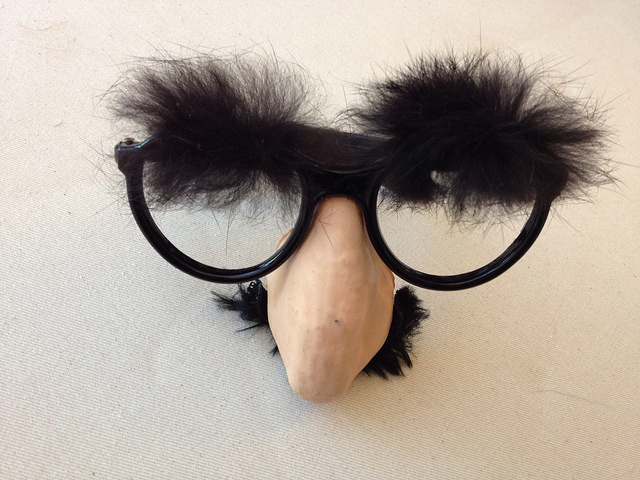My friend Sid once placed a Groucho Marx mask in a hotel room where the Dalai Lama would be staying during a visit to an Ivy League university. It was a gesture of bravado and karmic abandon because, really, who could gauge the terrestrial and spiritual consequences of such an act? And it was also a gesture of friendliness, because His Holiness had once told Sid, a main organizer of His Holiness’s visit, that always having to be the Dalai Lama didn’t give him much freedom. So much politics, so much responsibility. Being a compassionate fellow, Sid wanted to help. A disguise—humorous and absurd—he thought, would be just the thing.
So imagine this: a small cascade of university bureaucrats arrayed in the Dalai Lama’s suite, waiting for their guest to appear. They sit erect in armchairs designed for slouching. They’re keyed-up by the barricade of media flacks surrounding the hotel, the barricade of FBI men surrounding the suite, the barricade of fear—they have spent inordinate amounts of donor money on this visit. And they, like all humans, harbor the deep longing to be knocked back, up, out by an influx of spirit and greatness.
Minutes pass and then a door flings open. Unaccountably, Groucho Marx—wearing long maroon robes and serious lace-up shoes—emerges, chuckling loudly. Laughing so hard that tears come to his bespectacled eyes.
It isn’t until a decade after the event that I hear this story. Sid tells it over a dinner of muscular salads at a local vegetarian eatery. He gives it away as though it were a dusty piece of personal history that he never thought worth telling before. But I am charmed and astounded. Would the Pope do this? I think to myself. Would John Paul, who reputedly has a sense of humor and even a penchant for theatrics, ever meet dignitaries—even Ivy League peons—while wearing Marx Brothers’ attire of any kind, except possibly a harp? And if he did, what then? Does it raise or lower the spirituality ratings?
What then? How do people react when a dignitary—especially of the spiritual kind—does something so, well, undignified? Intrigued, I call up the university official in charge of the visits of dignitaries. She’s someone who routinely meets with the accomplished and the famous and the presidential, and she clearly is not a woman easily impressed. How did she feel, I asked, at the Groucho moment? At first, she tells me, she didn’t know how to react. And then she and everyone started to laugh at the wonderful absurdity of the situation, laughed with an incaution uncharacteristic of people in their position.
“This man projected such tremendous happiness and love—all of it beyond words, genuine—you couldn’t help but become part of it,” she said, still astonished, all these years later.
What’s with the Dalai Lama? Or maybe the question is, what’s with Buddhism? Because—at least in part—it’s the Tibetan’s philosophical view that underlies his disregard for the usual pomp.
As trendy as Buddhism has become, it’s often misunderstood in America. It’s not just about meditation and bliss and the chanting of om. It’s about being free of the domination of the ego. Buddhism means not being concerned whether or not you’re seen as a hot-shot Dalai Lama or a hot-shot Pope or a hot-shot parent or even a halfway decent anything. It means not being jerked around by the need to look as good as possible, to others and to yourself. The ego is just a construct. Get over it.
Incredibly difficult, of course. One ancient, wizened Tibetan lama—revered as a great meditation master—would occasionally hide a whoopee cushion in his guest chair. You can imagine. You’re about to confess the drama of your inner life to the wise man. Or maybe you’re interviewing him for an article. You lean forward and suddenly a loud fart bellow from the region of your buttocks. Perhaps it’s a test; perhaps it’s a joke; perhaps it’s you. Do you despair or laugh or what?
The Dalai Lama didn’t care about being a hot-shot. He saw a chance for fun, for deflating others’ expectations, and he took it. And he just somehow knew whom to thank. Wagging his finger at Sid, he took off the mask, still laughing. Even he needs a little Groucho in his life.
Thank you for subscribing to Tricycle! As a nonprofit, we depend on readers like you to keep Buddhist teachings and practices widely available.
